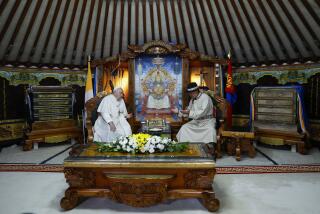Pope Calls on Angolans to Overcome Bloody Past : Africa: The pontiff encourages nation’s efforts to heal wounds of 16-year civil war.
- Share via
LUANDA, Angola — As a symbol of Cold War futility, the huge concrete finger that rises high above the waterfront here is unsurpassed. Soviet-designed, it was supposed to be a soaring monument to Marxist revolution, the center of a kind of Red Square in the heart of Africa.
The monument was abandoned unfinished. Wrapped in grimy scaffolding, it is now a giant sore thumb dominating the skyline and the consciousness of a nation that endured nearly a generation of war and misery as a Great Power pawn.
From an altar near the monument, red-robed Pope John Paul II prayed Sunday that Angola would have the courage to overcome its bloody past. Among the worshipers, an international civil servant silently echoed his plea.
“Beloved people of Angola, how I would like to be able to give hope and courage to all those who feel oppressed, lost or cast aside. To drag from the hearts of the children and young people those horrible images of blood and destruction,” the Pope told tens of thousands of Angolans in the largest ceremony of his weeklong visit.
Angola is stumbling toward its first free elections, one year after a cease-fire halted a 16-year civil war that began in earnest with independence from Portugal in 1975.
The Soviet Union and Cuba, with 50,000 troops, supported the Popular Movement for the Liberation of Angola, headed now by President Jose Eduardo dos Santos. The United States and South Africa supported the National Union for the Total Independence of Angola, headed by Jonas Savimbi.
About 300,000 people died. More than 1 million of the 10 million Angolans are still displaced in the aftermath of violence that destroyed the social and physical fabric of their country. But now, in exhaustion, the two enemies are working uneasily together in the run-up to elections scheduled for the end of September.
“May the spirit of unity and of peace give you the grace to continue knocking down the walls that divide you and to work together for the construction of the country--a country where all have a place and a voice and can pursue their lives with dignity for themselves and their families,” the Pope said.
Meeting Angolan young people later, John Paul urged them to overcome the temptation to indifference or to live superficially in the aftermath of scarring violence.
“Many of you were born and grew up amid the worst of difficulties and privations because the only thought that you had at hand was war: war, more war and always war, like a cortege of horrors, tragedies and deaths without end,” the Pope said.
“Many of you may imagine that nothing exists beyond suffering and isolation. But it is not true. . . ,” John Paul said, urging the youths to seek “love stronger than death,” the God, he said, who “saved my life”--a reference to his wounding in a 1981 assassination attempt.
Sitting among the diplomatic corps at Sunday’s Mass, Margaret J. Anstee liked what she heard.
“It is a great help to hear him talk of reconciliation, reconstruction and tolerance. It is a message the country needs to hear,” said Anstee, who is chief of the United Nations’ Angola Verification Mission, which oversees the international community’s support for the peace process.
The two armies that fought one another with Soviet and American weapons for so long are now camped separately in 67 assembly points around the country under U.N. supervision. An estimated 200,000 fighters are scheduled to be demobilized or reassigned into a new national armed force of 50,000--half from each side.
Political temperatures are apt to rise as the elections approach, Anstee said in an interview, but what is particularly cheering to observers as disparate as the international community, everyday Angolans and the Pope, is that there have been no major breaches of the cease-fire since it took effect a year ago.
“After 16 years of fighting, that is remarkable,” Anstee said. “I have a gut feeling that we’ll get to elections. They will be difficult moments. But I think both sides realize there is no other way out.”
More to Read
Sign up for Essential California
The most important California stories and recommendations in your inbox every morning.
You may occasionally receive promotional content from the Los Angeles Times.









